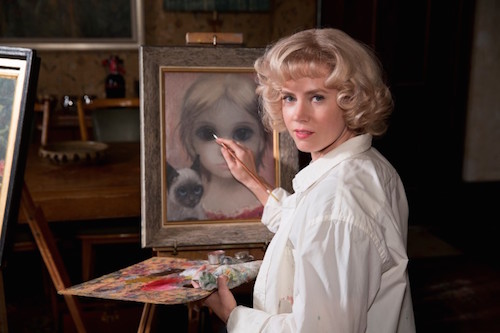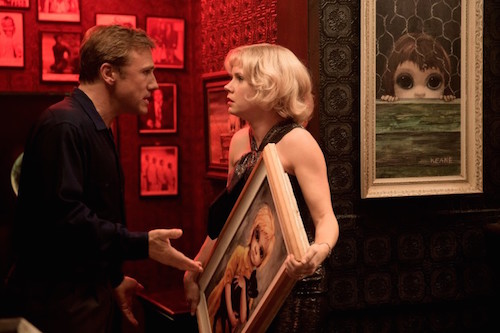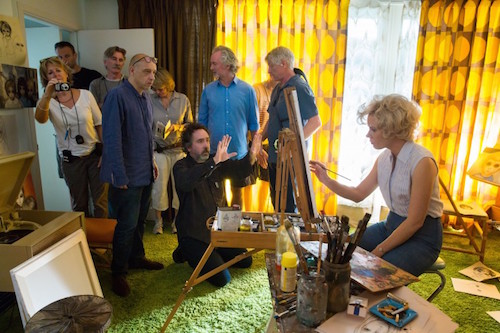Synopsis: From the whimsical mind of director Tim Burton, Big Eyes tells the outrageous true story of one of the most epic art frauds in history. In the late 1950s and early 1960s, painter Walter Keane (Christoph Waltz) had reached success beyond belief, revolutionizing the commercialization of popular art with his enigmatic paintings of waifs with big eyes. The bizarre and shocking truth would eventually be discovered though: Walter’s works were actually not created by him at all, but by his wife Margaret (Amy Adams). The Keanes, it seemed, had been living a colossal lie that had fooled the entire world. A tale too incredible to be fiction, Big Eyes centers on Margaret’s awakening as an artist, the phenomenal success of her paintings, and her tumultuous relationship with her husband, who was catapulted to international fame while taking credit for her work.
Release Date: December 25, 2014 MPAA Rating: PG-13
Genre(s): Drama, Biopic
Film Review

Production
The story of Margaret Keane and her “Big Eyes” paintings is an interesting one, but you wouldn’t know it from watching Tim Burton’s Big Eyes. A biopic without nuance, substance, or style, Big Eyes is the Wikipedia version of Keane’s story, hitting only the most important moments from her life without stringing them together in a composed or confident way. This is as straightforward as biopics can get and while it’s a decently-made film with a strong leading performance from Amy Adams it still doesn’t show much in the way of life. Keane’s paintings may be bold, colorful pieces overwrought with emotional turmoil, but her biopic is anything but.
Even those who may not be familiar with Keane’s story will find little in the way of intrigue. Margaret Ulbrich is a single mother living in San Francisco when she meets Walter Keane at a modest art festival. Walter notices Margaret’s talent and Margaret notices Walter’s affections, and it isn’t long before the two begin a love affair. However, while Walter seemingly has a knack for painting here and there, Margaret is undeniably gifted. Walter recognizes it even more than she does and soon capitalizes on an idea. Since Walter is a better salesman than he is a painter and Margaret is a better painter than she is a salesman, the two decide that Walter will take ownership for Margaret’s unique “Big Eyes” paintings. Both get the success they always dreamed of, but with Walter accepting all the fame. And it isn’t long before Walter starts to believe his own lies, and his and Margaret’s elaborate scheme begins to ruin their lives.

Even that brief synopsis suggests that the Walter and Margaret Keane story is well-suited for a feature film. There’s conflict, intrigue, and dynamic characters. But what Tim Burton delivers is far too tame to be anything but mediocre. Even worse, the narrative through-line of Big Eyes is unsure where to place our focus. At times it seems Margaret’s struggle with keeping up the lie is most important, but then the film puts a spotlight on the artistic work. The film is more a series of slightly connected scenes than anything else, a bullet point breakdown of the key events in Margaret’s life. But by presenting these scenes as bullet points, the film loses any semblance of personality. You feel bad for Margaret out of obligation and a general disdain for Walter’s character, but it’s not as if you root for her. She simply exists as a cinematic representation of a real character constructed for informative purposes.

That being said, Amy Adams does her best with the threadbare material. She makes Margaret as multi-dimensional as possible, while also bringing a vulnerability to the character. Her performance is noteworthy if only because it feels like she’s trying, all the while the rest of the film is getting by with the bare minimum. Christoph Waltz, for example, is a cookie-cutter villain as Walter Keane. He’s a seedy individual from the very first moment we meet him, which makes his and Margaret’s love affair all the more unbelievable. We’re supposed to buy that Walter is persuasive and charming, but the film never effectively communicates that. He’s as flat as the biopic, lacking dimension or nuance.

By the time the credits roll on Big Eyes, audiences will feel informed but unsatisfied. Tim Burton’s film takes the shortest route from point A to point B, and hardly makes the journey feel worth it. Learning Margaret Keane’s story should have been enough to keep the film afloat, but even then Big Eyes oversimplifies too much and puts forth too little when it comes to effort. Only Amy Adams seems moderately interested in making Big Eyes a compelling film, but she’s surrounded by mediocre material at best. This is the type of lifeless, paint by numbers biopic that proves an interesting story does not instantly translate into a successful movie.

Directing
With Tim Burton at the helm, you would think that at the very least Big Eyes would have some personality, but unfortunately even the filmmaking is unremarkable. There’s some decent production design and costume work, but the film hardly feels like a Tim Burton production. Even the score, by longtime Burton collaborator Danny Elfman, lacks an appreciable character. It, like the direction, flies the straight and narrow path to serviceability. It’s only worth mentioning the direction because that will be a major selling point for some. Unfortunately, it fails to display Burton’s stylistic indulgences or his ability to craft sophisticated, albeit a little strange, characters. Big Eyes is fine for a biopic and significantly disappointing for a Burton production.

Cast and Crew
- Director(s): Tim Burton
- Producer(s):
- Screenwriter(s): Scott AlexanderLarry Karaszewski
- Story:
- Cast: Amy Adams (Margaret Keane)Christoph Waltz (Walter Keane)Jason Schwartzman (Ruben) Krysten Ritter (DeeAnn)
- Editor(s): JC Bond
- Cinematographer: Bruno Delbonnel
- Production Designer(s):
- Costume Designer:
- Casting Director(s):
- Music Score: Danny Elfman
- Music Performed By:
- Country Of Origin: USA
